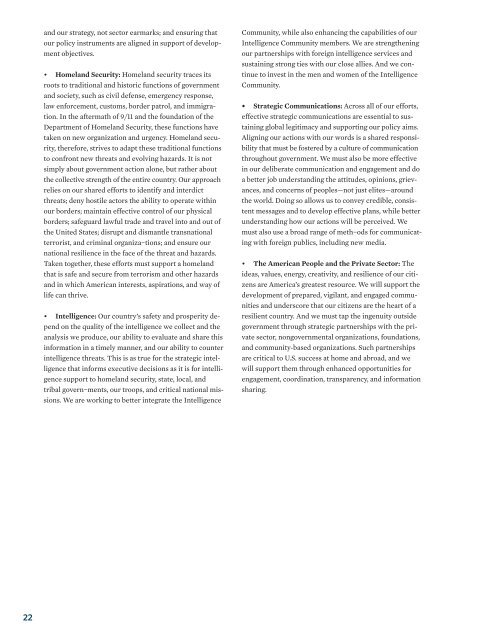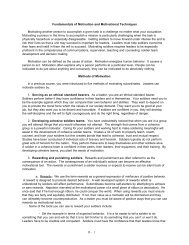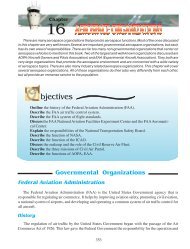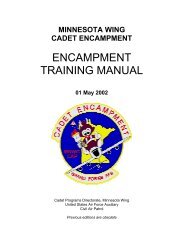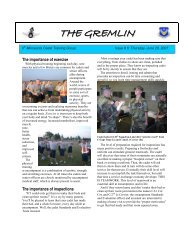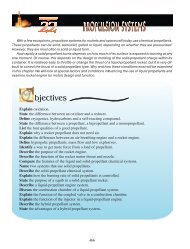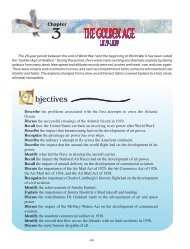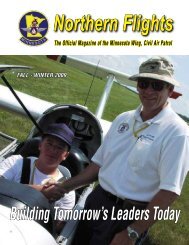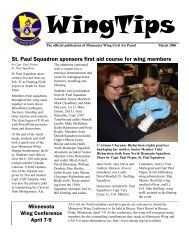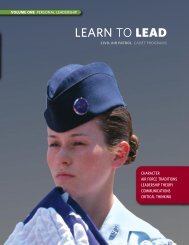and our strategy, not sector earmarks; and ensuring thatour policy instruments are aligned in support of developmentobjectives.• Homeland Security: Homeland security traces itsroots to traditional and historic functions of governmentand society, such as civil defense, emergency response,law enforcement, customs, border patrol, and immigration.In the aftermath of 9/11 and the foundation of theDepartment of Homeland Security, these functions havetaken on new organization and urgency. Homeland security,therefore, strives to adapt these traditional functionsto confront new threats and evolving hazards. It is notsimply about government action alone, but rather aboutthe collective strength of the entire country. Our approachrelies on our shared efforts to identify and interdictthreats; deny hostile actors the ability to operate withinour borders; maintain effective control of our physicalborders; safeguard lawful trade and travel into and out ofthe United States; disrupt and dismantle transnationalterrorist, and criminal organiza¬tions; and ensure ournational resilience in the face of the threat and hazards.Taken together, these efforts must support a homelandthat is safe and secure from terrorism and other hazardsand in which American interests, aspirations, and way oflife can thrive.• Intelligence: Our country’s safety and prosperity dependon the quality of the intelligence we collect and theanalysis we produce, our ability to evaluate and share thisinformation in a timely manner, and our ability to counterintelligence threats. This is as true for the strategic intelligencethat informs executive decisions as it is for intelligencesupport to homeland security, state, local, andtribal govern¬ments, our troops, and critical national missions.We are working to better integrate the IntelligenceCommunity, while also enhancing the capabilities of ourIntelligence Community members. We are strengtheningour partnerships with foreign intelligence services andsustaining strong ties with our close allies. And we continueto invest in the men and women of the IntelligenceCommunity.• Strategic Communications: Across all of our efforts,effective strategic communications are essential to sustainingglobal legitimacy and supporting our policy aims.Aligning our actions with our words is a shared responsibilitythat must be fostered by a culture of communicationthroughout government. We must also be more effectivein our deliberate communication and engagement and doa better job understanding the attitudes, opinions, grievances,and concerns of peoples—not just elites—aroundthe world. Doing so allows us to convey credible, consistentmessages and to develop effective plans, while betterunderstanding how our actions will be perceived. Wemust also use a broad range of meth¬ods for communicatingwith foreign publics, including new media.• The American People and the Private Sector: Theideas, values, energy, creativity, and resilience of our citizensare America’s greatest resource. We will support thedevelopment of prepared, vigilant, and engaged communitiesand underscore that our citizens are the heart of aresilient country. And we must tap the ingenuity outsidegovernment through strategic partnerships with the privatesector, nongovernmental organizations, foundations,and community-based organizations. Such partnershipsare critical to U.S. success at home and abroad, and wewill support them through enhanced opportunities forengagement, coordination, transparency, and informationsharing.22
12.3 Leadership and Systems ThinkingBy COL George E. Reed, USAOBJECTIVES:9. List three steps in the systems thinking approach.10. Identify barriers to our ability to use systems thinking.“‘For every problem there is a solution that issimple, neat – and wrong.’ This maxim hasbeen attributed at various times to MarkTwain, H.L. Mencken, and Peter Drucker as awake-up call to managers who mistakenlythink that making a change in just one part of acomplex problem will cure the ails of an entiresystem. Everyday management thinking toooften looks for straightforward cause andeffect relationships in problem solving thatignores the effect on, and feedback from, theentire system.”-Ron Zemke,writing in the February 2011 issue of TrainingLeaders operate in the realm of bewildering uncertaintyand staggering complexity. Today’s problems are rarelysimple and clear-cut. If they were, they would likelyalready have been solved by someone else. If not wellconsidered—and sometimes even when they are—today’ssolutions become tomorrow’s problems. Success in thecontemporary operating environment requires differentways of thinking about problems and organizations. Thisarticle introduces some concepts of systems thinking andsuggests that it is a framework that should be understoodand applied by leaders at all levels, but especially thosewithin the acquisition community. It is insufficient andoften counterproductive for leaders merely to act as goodcogs in the machine. Leaders perform a valuable servicewhen they discern that a venerated system or process hasoutlived its usefulness, or that it is operating as originallydesigned but against the organization’s overall purpose.Sometimes we forget that systems are created by people,based on an idea about what should happen at a givenpoint in time. A wise senior warrant officer referred tothis phenomenon as a BOGSAT—a bunch of guys sittingaround talking.SYSTEMS ENDUREAlthough times and circumstances may change, systemstend to endure. We seem to be better at creating new systemsthan changing or eliminating existing ones. SociologistRobert K. Merton coined the term “goal displacement”to describe what happens when complying with bureaucraticprocesses becomes the objective rather than focusingon organizational goals and values. When that happens,systems take on a life of their own and seem immune tocommon sense. Thoughtless application of rules and procedurescan stifle innovation, hamper adaptivity, anddash creativity. Wholesale disregard of rules and procedures,however, can be equally disastrous.When members of an organization feel as though theymust constantly fight the system by circumventing establishedrules and procedures, the result can be cynicism ora poor ethical climate. Because of their experience andposition, leaders are invested with the authority to interveneand correct or abandon malfunctioning systems. Atthe very least, they can advocate for change in a way thatthose with less positional authority cannot. Leaders at alllevels should, therefore, be alert to systems that drivehuman behavior inimical to organizational effectiveness.It is arguable that military organizations placing a premiumon tradition and standardization are predisposed togoal displacement. We need leaders, therefore, who cansee both the parts and the big picture; to this end some ofthe concepts of systems thinking are useful.The Department of Defense is a large and complex socialsystem with many interrelated parts. As with any systemof this type, when changes are made to one part, manyothers are affected in a cascading and often unpredictablemanner. Thus, organizational decisions are fraught withsecond- and third-order effects that result in unintendedconsequences. “Fire and forget” approaches are rarelysufficient and are sometimes downright harmful. Extensiveplanning—combined with even the best of intentions—does not guarantee success. Better prediction is not theanswer, nor is it possible. There are so many interactionsin complex systems that no individual can be expected toforecast the impact of even small changes that are amplifiedover time.GETTING BEYOND THE MACHINEMETAPHORIn her book Organization Theory: Modern, Symbolic, andPostmodern Perspectives, Mary Jo Hatch provides anintroduction to general systems theory that is useful in23
- Page 1 and 2: VOLUME FOUR STRATEGIC PERSPECTIVESL
- Page 3 and 4: VOLUME FOUR STRATEGIC PERSPECTIVESL
- Page 5 and 6: VOLUME FOUR STRATEGIC PERSPECTIVESL
- Page 7: VOLUME FOUR STRATEGIC PERSPECTIVESL
- Page 10 and 11: 12CHAPTER 12INTRODUCTION TO STRATEG
- Page 12 and 13: 12.1 Strategic Leadership: Defining
- Page 14 and 15: mandates or resolutions that would
- Page 16 and 17: and ambiguity, aspiring strategic l
- Page 18 and 19: 12.2 National Security StrategyThe
- Page 20 and 21: within our borders has always been
- Page 22 and 23: front common challenges like violen
- Page 26 and 27: thinking about organizations. She m
- Page 28 and 29: A systemic approach to failure is m
- Page 30 and 31: The late W. T. Grant Company is a r
- Page 32 and 33: the resources - setting the directi
- Page 34 and 35: focal point for describing and inte
- Page 36 and 37: Consequently, we do not restrict th
- Page 38 and 39: paragraphs, Web pages, then edit an
- Page 40 and 41: Web, can be viewed as a CS attempt
- Page 42 and 43: How to evaluate users and contribut
- Page 44 and 45: 13CHAPTER 13LEADING PUBLIC &VOLUNTE
- Page 46 and 47: 13.1 Leadership for Volunteers:The
- Page 48 and 49: 13.2 Take Root: Volunteer Managemen
- Page 50 and 51: QualificationsClearly list educatio
- Page 52 and 53: and effectively track their volunte
- Page 54 and 55: • Understand rules for recognitio
- Page 56 and 57: • Send a birthday card.• Submit
- Page 58 and 59: and tested more than six decades af
- Page 60 and 61: specific interests of the donors, v
- Page 62 and 63: tain) tax-exempt status from the In
- Page 64 and 65: Smucker, 1999).The Internal Revenue
- Page 66 and 67: culture is necessary to ensure the
- Page 68 and 69: 13.4 The New Look of TransparencyBy
- Page 70 and 71: ees for a couple of reasons: One, i
- Page 72 and 73: 13.5 Public and Private Management:
- Page 74 and 75:
TABLE 1:FUNCTIONS OF GENERAL MANAGE
- Page 76 and 77:
3. Career System. The model corpora
- Page 78 and 79:
islative charter - the Clean Air Ac
- Page 80 and 81:
In controlling performance, Chapin
- Page 82 and 83:
14CHAPTER 14AIRPOWER ASSTRATEGIC LA
- Page 84 and 85:
14.1 Strategic Air Power: Fulfillme
- Page 86 and 87:
carry it out. Their daylight raids
- Page 88 and 89:
you did not rely on strategic bombi
- Page 90 and 91:
14.2 Warden and the Air Corps Tacti
- Page 92 and 93:
ecomes one of applying sufficient i
- Page 94 and 95:
tification, and a Jominian claim to
- Page 96 and 97:
courage the rapid and widespread ex
- Page 98 and 99:
it to influence physical players in
- Page 100 and 101:
14.4 Basic Air Force DoctrineAF Doc
- Page 102 and 103:
earthquake-stricken Haiti. The worl
- Page 104 and 105:
perspective. Airmen do not divide u
- Page 106 and 107:
Command and ControlCommand and cont
- Page 108 and 109:
14.5 Should the US Maintain the Nuc
- Page 110 and 111:
form of human government.” 20 Dem
- Page 112 and 113:
obtainable goal. See the Global Zer
- Page 114 and 115:
15CHAPTER 15ORGANIZATIONAL CULTURE
- Page 116 and 117:
15.1 Organizational CultureBy Doria
- Page 118 and 119:
Review. This action strives to unco
- Page 120 and 121:
gram will serve and then having the
- Page 122 and 123:
ticipating the changes being made b
- Page 124 and 125:
Many years of working with change p
- Page 126 and 127:
At the least, the areas of concern
- Page 128 and 129:
15.4 Developing an Innovative Cultu
- Page 130 and 131:
CONCLUDING THOUGHTSIn an ever-chang
- Page 132 and 133:
global issues. Businesses that poss
- Page 134 and 135:
— Sees the big picture—the shif
- Page 136 and 137:
16CHAPTER 16STRATEGIC COMMUNICATION
- Page 138 and 139:
16.1 Principles of Strategic Commun
- Page 140 and 141:
16.2 The Art of NegotiationBy Brend
- Page 142 and 143:
16.3 Negotiating Effectively Across
- Page 144 and 145:
hidden areas can act as cultural ho
- Page 146 and 147:
and four conflict styles. Hammer be
- Page 148 and 149:
maintaining the relationship. As th
- Page 150 and 151:
25 Mitchell R. Hammer, “Chapter 1
- Page 152 and 153:
tural, socioeconomic, and psycholog
- Page 154 and 155:
for the win-win," during which time
- Page 156 and 157:
interests and, at worst, as a gun s
- Page 158 and 159:
Public diplomacy is surely about mu
- Page 160 and 161:
But public diplomats do not have th
- Page 162 and 163:
Photo courtesy of the familyThe LEA
- Page 164:
THE CADET OATHI pledge that I will


